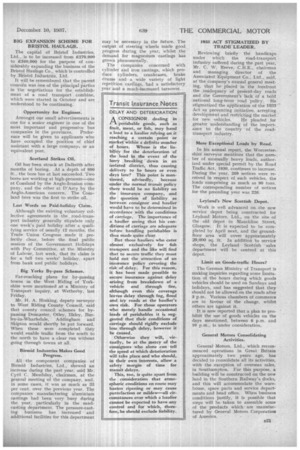Transit Insiirance Notes
Page 3

If you've noticed an error in this article please click here to report it so we can fix it.
DELAY AND DETERIORATION
A CONSIGNOR dealing in
perishable goods, such as fruit, meat, or fish, may hand a load to a haulier relying on it reaching a certain point or market within a definite number of hours. Whose is the liability for the deterioration of the load in the event of the lorry breaking down in an isolated district, thus causing delivery to be hours or even days late? This point is mentioned, advisedly, because under the normal transit policy there would be no liability on the insurance company, and the question of liability as between consignor and haulier would have to be determined in accordance with the conditions of carriage. The importance of a haulier seeing that his conditions of carriage are adequate before handling perishables is thus made quite cleat But those hauliers who cater almost exclusively for fish transport and the like will find that to secure traffic they must hold out the attraction of an insurance policy covering the risk of delay. For this reason, it has been made possible to secure insurance against delay arising from breakdown of a vehicle and through fire, although even this coverage leaves delay through fog, flood and icy roads at the haulier's own risk. For those operators who merely handle occasional loads of perishables it is suggested that their conditions of carriage should rigidly exclude loss through delay, however it be caused.
Otherwise they will, virtually, be at the mercy of the consignors who alone can tell the speed at which deterioration will take place and who should, in their own interests, allow a safety margin of time for transit delays.
This, too, is quite apart from the consideration that atmospheric conditions en route may hasten ripening or may cause putrefaction or mildew—all circumstances over which a haulier cannot be expected to have any control and for which, therefore, he should exclude liability.




























